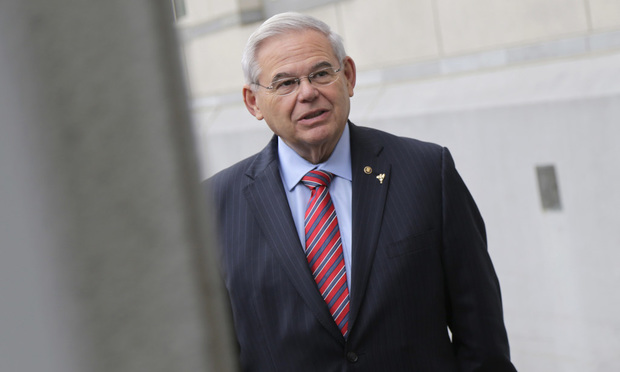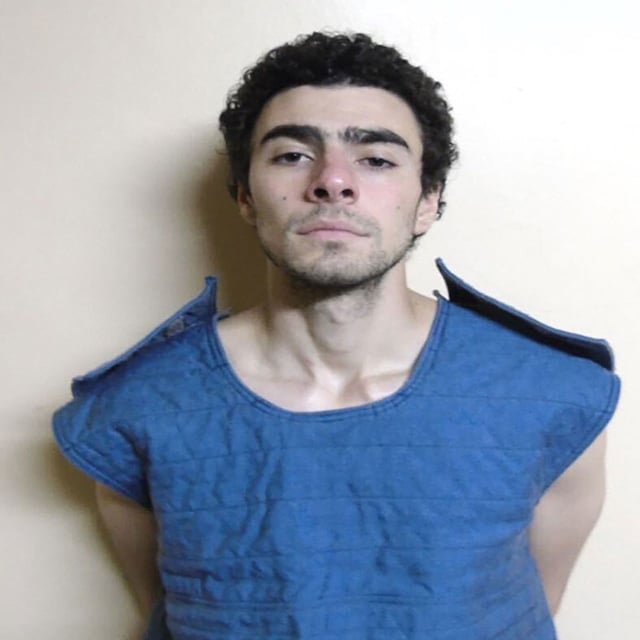Jury Begins Deliberations in Menendez Trial After Being Told of Narrower Standard for Bribery
Jurors began deliberations Monday in the corruption trial of U.S. Sen. Bob Menendez, D-New Jersey, after a closing argument by Abbe Lowell,…
November 06, 2017 at 06:00 PM
4 minute read

Jurors began deliberations Monday in the corruption trial of U.S. Sen. Bob Menendez, D-New Jersey, after a closing argument by Abbe Lowell, Menendez' lawyer, which informed the jury of a new, narrower definition of bribery under U.S. Supreme Court case law.
The 12-member jury was handed the case after hearing more than two months of testimony and being instructed by U.S. District Judge William Walls, who is presiding at trial, to return a unanimous verdict.
Lowell underscored the long-running friendship between his client and Florida eye doctor Salomon Melgen, a co-defendant in the case, as a defense to the bribery charges. Lowell also asserted that meetings and calls by Menendez and his staff to cabinet-level officials concerning port security and Medicare billing policies did not support the bribery charges because they arose from the senator's own legitimate public policy objectives, not attempts to help Melgen with his business ventures.
Lowell also suggested that charges against his client would not meet the revised definition of bribery outlined in the 2016 U.S. Supreme Court ruling overturning a corruption conviction in McDonnell v. United States. In that ruling, the corruption conviction of former Virginia Gov. Bob McDonnell was reversed based on a new, narrower definition of an official act.
Lowell's closing came after the prosecution and lawyers for Melgen wrapped up their cases on Nov. 2.
In the Menendez case, Melgen is accused of seeking the senator's help in a dispute with the Medicare program, which accused him of overbilling by $8.9 million. Melgen was accused of multidosing, or stretching one vial of medicine to treat two or three patients. Menendez claimed the government regulations on multidosing were unclear and a waste of government resources.
“As Judge Walls told you [in the jury charge], a matter must be more specific in focus than a broad policy objective,” Lowell said at Monday's closing argument.
Lowell also said allegations over Menendez's alleged intervention in Melgen's Medicare billing dispute and his port security business could not be proved beyond a reasonable doubt. What's more, instructions that come with forms in which senators report gifts don't make it clear whether personal hospitality from a friend must be reported, Melgen said.
Lowell also said that Menendez's attempts to help three women friends of Melgen obtain U.S. visas were not related to any things of value he received from Melgen, but were typical of numerous immigration cases in which the senator intervened on behalf of applicants.
Menendez is accused of accepting free flights on Melgen's private jet, political contributions and accommodations at upscale hotels in exchange for intervening with federal officials on the doctor's behalf in a Medicare billing dispute, providing help for regulatory issues concerning Melgen's port security business and helping three women friends of Melgen obtain visas.
Lowell told jurors that Menendez's enjoyment of hospitality from Melgen and advocacy on his behalf was no different from the jurors themselves inviting a friend to share a beach house or giving assistance with a friend's problem.
“This case is not about what was done, but why it was done. Friendship answers that completely,” Lowell said.
Lowell also accused the prosecution of failing to establish a quid pro quo in its allegations about Menendez's alleged advocacy for Melgen, and criticized what he called the “kitchen sink” indictment, likening its 18 counts to prosecutors throwing spaghetti on the wall to see if it sticks.
In his rebuttal to Lowell's closing argument, Assistant U.S. Attorney Peter Koski repeatedly accused the defense attorney of “sleight of hand.”
“The issue in this case is not whether Sen. Menendez and Dr. Melgen were friends. The issue is whether they committed a crime together,” Koski said. “A U.S. senator can't take a bribe and say you can't convict me because that guy is my friend.”
Koski said the reasonable-doubt standard that applies to the charges does not mean the prosecution must establish proof of guilt beyond all doubt. “All we are asking you to do is base your decision on the evidence before you. If you do that, it will be as easy as telling a greedy doctor and a corrupt politician you can't bill Medicare three times for something you paid for once.”
This content has been archived. It is available through our partners, LexisNexis® and Bloomberg Law.
To view this content, please continue to their sites.
Not a Lexis Subscriber?
Subscribe Now
Not a Bloomberg Law Subscriber?
Subscribe Now
NOT FOR REPRINT
© 2025 ALM Global, LLC, All Rights Reserved. Request academic re-use from www.copyright.com. All other uses, submit a request to [email protected]. For more information visit Asset & Logo Licensing.
You Might Like
View All



Suspected Shooter of UnitedHealthcare CEO Is Charged With Murder in New York. Now What?
Trending Stories
- 1'It's Not Going to Be Pretty': PayPal, Capital One Face Novel Class Actions Over 'Poaching' Commissions Owed Influencers
- 211th Circuit Rejects Trump's Emergency Request as DOJ Prepares to Release Special Counsel's Final Report
- 3Supreme Court Takes Up Challenge to ACA Task Force
- 4'Tragedy of Unspeakable Proportions:' Could Edison, DWP, Face Lawsuits Over LA Wildfires?
- 5Meta Pulls Plug on DEI Programs
Who Got The Work
Michael G. Bongiorno, Andrew Scott Dulberg and Elizabeth E. Driscoll from Wilmer Cutler Pickering Hale and Dorr have stepped in to represent Symbotic Inc., an A.I.-enabled technology platform that focuses on increasing supply chain efficiency, and other defendants in a pending shareholder derivative lawsuit. The case, filed Oct. 2 in Massachusetts District Court by the Brown Law Firm on behalf of Stephen Austen, accuses certain officers and directors of misleading investors in regard to Symbotic's potential for margin growth by failing to disclose that the company was not equipped to timely deploy its systems or manage expenses through project delays. The case, assigned to U.S. District Judge Nathaniel M. Gorton, is 1:24-cv-12522, Austen v. Cohen et al.
Who Got The Work
Edmund Polubinski and Marie Killmond of Davis Polk & Wardwell have entered appearances for data platform software development company MongoDB and other defendants in a pending shareholder derivative lawsuit. The action, filed Oct. 7 in New York Southern District Court by the Brown Law Firm, accuses the company's directors and/or officers of falsely expressing confidence in the company’s restructuring of its sales incentive plan and downplaying the severity of decreases in its upfront commitments. The case is 1:24-cv-07594, Roy v. Ittycheria et al.
Who Got The Work
Amy O. Bruchs and Kurt F. Ellison of Michael Best & Friedrich have entered appearances for Epic Systems Corp. in a pending employment discrimination lawsuit. The suit was filed Sept. 7 in Wisconsin Western District Court by Levine Eisberner LLC and Siri & Glimstad on behalf of a project manager who claims that he was wrongfully terminated after applying for a religious exemption to the defendant's COVID-19 vaccine mandate. The case, assigned to U.S. Magistrate Judge Anita Marie Boor, is 3:24-cv-00630, Secker, Nathan v. Epic Systems Corporation.
Who Got The Work
David X. Sullivan, Thomas J. Finn and Gregory A. Hall from McCarter & English have entered appearances for Sunrun Installation Services in a pending civil rights lawsuit. The complaint was filed Sept. 4 in Connecticut District Court by attorney Robert M. Berke on behalf of former employee George Edward Steins, who was arrested and charged with employing an unregistered home improvement salesperson. The complaint alleges that had Sunrun informed the Connecticut Department of Consumer Protection that the plaintiff's employment had ended in 2017 and that he no longer held Sunrun's home improvement contractor license, he would not have been hit with charges, which were dismissed in May 2024. The case, assigned to U.S. District Judge Jeffrey A. Meyer, is 3:24-cv-01423, Steins v. Sunrun, Inc. et al.
Who Got The Work
Greenberg Traurig shareholder Joshua L. Raskin has entered an appearance for boohoo.com UK Ltd. in a pending patent infringement lawsuit. The suit, filed Sept. 3 in Texas Eastern District Court by Rozier Hardt McDonough on behalf of Alto Dynamics, asserts five patents related to an online shopping platform. The case, assigned to U.S. District Judge Rodney Gilstrap, is 2:24-cv-00719, Alto Dynamics, LLC v. boohoo.com UK Limited.
Featured Firms
Law Offices of Gary Martin Hays & Associates, P.C.
(470) 294-1674
Law Offices of Mark E. Salomone
(857) 444-6468
Smith & Hassler
(713) 739-1250






